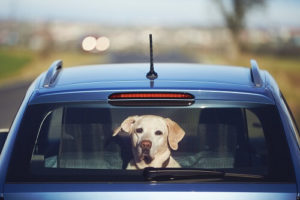How to Help Pet Motion Sickness Caused by Car Travel
With the holidays in full swing, you may be planning to travel to see family and friends in the not-so-distant future. Since your pet is part of your family, it makes sense that you would want to bring it along on your travels.

Traveling with pets by plane can be expensive and stressful, so choosing to drive to your destination with your furry friend makes sense. However, just like humans, pets can also get motion sickness, which can make traveling with them a less-than-pleasant experience.
Fortunately, there are things that you can do for your sweet pet which can alleviate the worst of motion sickness symptoms.
Why Do Pets Get Motion Sick in Cars?
You may be wondering why pets can get motion sickness. Here are some of the common reasons:
- In puppies, their inner ear structures are not fully developed yet. Since these structures are used for balance, their lack of development can cause them to feel dizzy and then sick in cars. The good news about this is that your puppy should start to outgrow this around the time they are one year old.
- If your pet typically only rides in the car because they are on their way to the vet’s office, they may get sick due to stress. They associate riding in the car with the stressful visit that happens afterward, which can heighten any motion sickness symptoms.
- If your dog frequently got sick as a puppy after riding in the car, they may grow to associate riding in the car with getting sick.
- If your pet is taking medication that causes any stomach upset, the motion and stress from riding in a car may exacerbate those symptoms.
- Pets can end up swaying in the car more than people because they can’t sit down completely, and they also can’t anticipate turns and other upcoming movements to then brace themselves accordingly. This back-and-forth motion can lead to motion sickness, especially if there are many turns or stops/starts along the trip.
How Can I Tell If My Pet Is Getting Motion Sickness?
There are many different ways that your pet may show you that they are starting to feel sick. In a dog, motion sickness symptoms may look like:
- Inactivity
- Whining and pacing
- Restlessness
- Excessive yawning or drooling
- Licking lips
- A look of discomfort or distress
- Vomiting or Diarrhea
In cats, many of the symptoms are similar, but not identical to the symptoms that our canine friends experience. In cats, warning signs of motion sickness are:
- Loud howling or meowing
- Pacing
- Excessive drooling or lip licking
- Lethargy
- Constriction of the neck or throat muscles
- Vomiting or Diarrhea
If you start to notice your pet exhibiting any of these symptoms, letting them get out of the car and taking them on a short walk should help alleviate their discomfort. Even though motion sickness can be an ordeal to handle while traveling, your pets’ symptoms should generally abate once the vehicle stops and they’re able to take a break from the car.
What Can I Do To Prevent Motion Sickness In My Pet?
Though it will involve extra time and planning, it is possible to help condition your pet so that they can travel comfortably in a car with your family. Here are some things you can do to help your pet travel successfully:
Recondition Your Pet
According to Tammy Hunter, DVM, if your pet is becoming motion sick due to stress, “the best way to ease your pet’s travel anxiety is by taking several short trips before embarking on a long haul.” This may work especially well if your pet generally only rides in the car when going to the vet. If your pet seems anxious, you could try having them travel in a different vehicle, taking them on short trips to places they enjoy, using treats to help make the car a fun place for your pet, or possibly even buy a special toy that they only have access to when in the car.
Evaluate Your Pet’s Physical Comfort in the Car
In order to help your pet feel more comfortable in the vehicle, there are a few things you can do. In order to reduce their symptoms, having your dog face forward and stay toward the front of the vehicle can help immensely. Having the windows cracked can help reduce air pressure in the car and allow for better ventilation.
You may also want to restrict food from your pet in the hours before the trip. Additionally, exercising your pet before the trip and stopping for frequent potty breaks can help your pet get rid of any anxious energy.
Medicate Your Pet
Though not always necessary, some pet parents choose to medicate their pets before long trips. These medications can either be found over the counter or may be prescribed by your vet. You may be interested in anti-nausea medicine, antihistamines, or sedatives. Even if you can purchase these medicines at a store, it is still vitally important that you consult with your vet to make sure your pet will tolerate them without any issues. You should also seek personalized advice on dosing based on your pet’s medical history.
Try Holistic Treatments
If you don’t want to medicate your pet, some pet parents choose to treat symptoms using all-natural ingredients. Some ideas may be to give your pet ginger pills or cookies before a trip, diffusing scents such as lavender or peppermint, or even giving your pet a massage before the trip to help alleviate their stress and get them to relax.
Greenlin Is Your Pet’s Home Away From Home
If after trying these tips and tricks, your pet is still suffering from motion sickness — or if you won’t have a chance to work with your pet before your big trip — Greenlin Pet Resorts is here for you and your family! With 5 convenient locations in Pennsylvania, we are here to provide your furry friends with a safe, comfortable, and fun pet boarding environment when it’s not possible for them to be with you.
From boarding to dog daycare to pet training, Greenlin is here for all your boarding and behavioral needs. Take some stress off of your shoulders this holiday season and contact us so that we can get started planning your pet’s vacation with us. Our friendly, knowledgeable, and first-aid-trained staff is waiting to hear from you!
